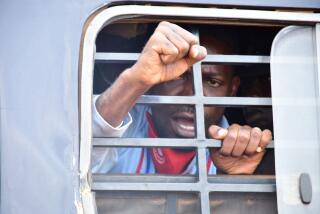‘Children, Apartheid’ a Striking Look at Division in S. Africa
- Share via
Roxanne Botha and Zinzi Mandela are both 27. There the similarity ends, for one personifies the oppressor and one the oppressed in the institutionalized racism of South Africa.
Roxanne’s father is President P. W. Botha, whose white minority government continues to imprison Zinzi’s father, Nelson Mandela, and to harass her mother, Winnie Mandela. The revolutionary Mandelas are South Africa’s best-known anti-apartheid leaders.
If only Roxanne and Zinzi could be in the same room, face to face. “CBS Reports” did not manage that. But what it did manage--interviewing them for the same program--helps make “Children of Apartheid” (8 tonight on Channels 2 and 8) a unique and striking documentary that deserves your attention.
Reported by Walter Cronkite and produced by Brian T. Ellis (who interviewed a cross section of young South Africans throughout the country), “Children of Apartheid” penetrates the color barrier on a people level.
You marvel at Ellis’ access (and also wonder about the intrusiveness of his camera from time to time) in this important and illuminating program about a country where non-white children are victimized by the Pretoria regime at an alarming rate.
Those adult daughters of apartheid--Roxanne speaking from a privileged world of wind-surfing and garden parties, Zinzi from a world of poverty--occupy only a portion of the program. But their comments are skillfully juxtaposed in such a way as to thread much of the hour; they become a metaphor for the intense and sometimes bloody struggle occurring inside South Africa.
Roxanne Botha favors a “fast moderate approach” to solving South Africa’s problems and opposes “rushing into solutions.” Easy to say when you’re not on the wrong side of apartheid.
“Such brutality, such inhumanity,” Zinzi Mandela says about the government’s imprisonment of “innocent children. Innocent mothers. You know, mothers actually give birth in detention.”
Roxanne says her father is “really a very loving person and full of fun.” Zinzi would like to kick him “where it hurts most.”
One can understand a daughter loving and supporting her father. But you detect a dead spot in Roxanne’s brain when she faults “unlawful” dissent. “I mean, I can go to my father, any young person in this country can go to the president and say to him, ‘Sir, I disagree with this, that or the other thing.’ And if he doesn’t want to change it, then there are laws to vote him out.”
Except that the Zinzis of South Africa have no vote.
Tonight’s program originally was to have opened with Cronkite stating: “This documentary is illegal.” However, the line was cut on the advice of a South African lawyer who screened the program at the request of CBS News and concluded that the line violated South Africa’s state-of-emergency censorship law.
The decision to consult the South African attorney was opposed by Ellis and triggered an internal dispute at CBS, where some felt that the network was appeasing Botha’s government at the expense of journalistic integrity. Other networks have reported taking similar precautions to avoid breaking the censorship law.
Ellis and others who opposed CBS seeking outside advice have a good point as a matter of principle. However, snipping the line doesn’t soften “Children of Apartheid,” whose young voices, from white suburbs and rural areas to ghettoized non-white townships, deliver a harsh, grim message.
Black teen-agers plan the murder of a suspected black government sympathizer. Twelve-year-old blacks are detained by police for a month without being charged. The 12-year-old daughter of a die-hard rural Afrikaner--a sweet-looking little girl with blond hair--believes the Bible teaches that blacks are animals and that race war is inevitable. And she’s not worried.
“God has said that He is with us,” she says.
More to Read
The complete guide to home viewing
Get Screen Gab for everything about the TV shows and streaming movies everyone’s talking about.
You may occasionally receive promotional content from the Los Angeles Times.






